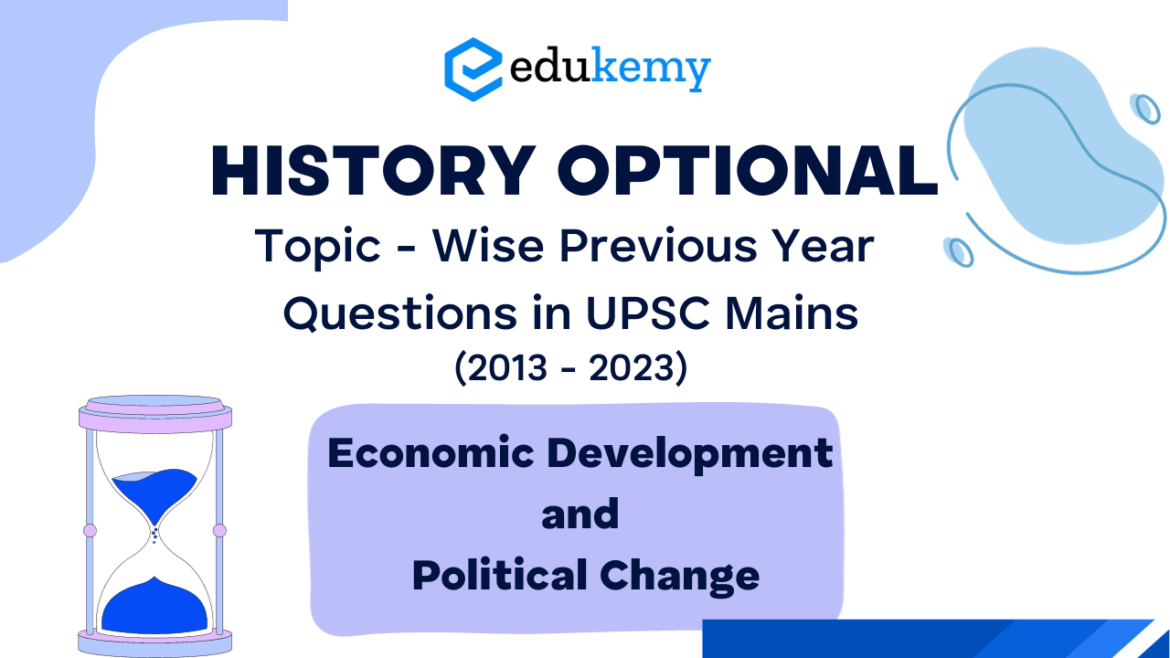History has always been a cornerstone of the Civil Services Examination conducted by the Union Public Service Commission (UPSC) in India. Among the various optional subjects available to aspirants, History holds a special place due to its ability to provide valuable insights into the socio-political and economic changes that have shaped our world. In this blog series, we embark on an enlightening journey through the annals of UPSC Mains examination, focusing on the optional subject of History. Specifically, we’ll delve into the previous year’s questions spanning from 2013 to 2023, analyzing how the discipline has evolved over the years and what aspiring civil servants can expect in terms of Economic Development and Political Change questions. The evolution of these questions offers a unique perspective on the changing demands and expectations of the UPSC examination, enabling history enthusiasts and aspirants alike to sharpen their knowledge and preparation.
Economic Development and Political Change is a vital aspect of history that not only reveals the path of nations’ progress but also the impact of political decisions on their economic well-being. This blog series aims to unearth the critical questions that have been posed to UPSC aspirants over the past decade, shedding light on the important dimensions, theories, and case studies that have been integral to this optional subject. Whether you’re a history buff, a future bureaucrat in the making, or just curious about the dynamics of political and economic change, this series is your gateway to understanding how history continues to play a pivotal role in shaping the leaders and policies of our nation. So, join us in exploring the past to gain insights into the present and pave the way for a brighter future through the lens of Economic Development and Political Change in the UPSC Mains examination.
Contents
Economic Development and Political Change History – Previous Year Questions (UPSC CSE Mains History Optional)
Economic development and political change; Land reforms; the politics of planning and rural reconstruction; Ecology and environmental policy In post-colonial India; Progress of science.
1. “Having won political freedom, India had to win economic and cultural freedom.” Comment. (1995)
2. “Nehru’s ‘temple of Modem India’ consisted not only of steel and power plants, irrigation dams, but included institutions of higher learning particularly in the scientific field.” Elaborate. (2011)
3. “The Chipko became famous as the first major environmental movement in post – colonial India and gave rise to the understanding that environmental issues are often women’s issues because they suffer most from its deterioration.” – Explain. (2012)
4. “Jawaharlal Nehru, though a declared socialist, was pragmatist enough to focus on providing building blocks to the making of a new India.”. Examine. (2015)
5. Critically examine the nature and scope of environmental movements in Independent India. (2016)
6. How far the developments in science and technology in post – Independence period put India on the path of modernity? (2017)
7. Trace the development of land reforms in India between 1947 and early 1960’s. (2018)
8. How did the introduction of Community Development Programme and Panchayati Raj promote welfare of rural India? (2019)
9. Planning was seen as a powerful instrument that could be used to remove regional inequality. Examine. (2020)
FAQs on Economic Development and Political Change
Q: What is the difference between economic growth and economic development?
A: Economic growth typically refers to an increase in the production of goods and services within a country’s economy, often measured by the Gross Domestic Product (GDP). On the other hand, economic development is a broader concept that encompasses improvements in the overall well-being of a society, including factors like income distribution, healthcare, education, and infrastructure. While economic growth is a component of economic development, development also considers social and human aspects.
Q: How do political changes influence economic development?
A: Political changes, such as shifts in government policies and leadership, can significantly impact economic development. Policies related to taxation, trade, regulation, and public spending can shape a nation’s economic trajectory. Political stability and good governance are crucial for fostering an environment conducive to economic growth and development.
Q: What are some historical examples of the interplay between economic development and political change?
A: Historical examples of this interplay include the Industrial Revolution in 18th-century Britain, where political changes like legal reforms and property rights protection spurred economic development. Another example is the transformation of post-war Japan, where political changes and government policies played a pivotal role in the nation’s rapid economic development.
Q: How does the UPSC examination test knowledge of Economic Development and Political Change?
A: The UPSC examination evaluates candidates’ understanding of these subjects through optional papers like History. Questions can range from historical events influencing economic development to the impact of political changes on a country’s economic trajectory. Aspirants are required to demonstrate in-depth knowledge and critical analysis of these topics.
Q: Why is it essential to study Economic Development and Political Change for the UPSC exam?
A: These subjects are crucial for aspiring civil servants because they provide insights into the complex and intertwined dynamics of politics and economics. Understanding how governments and political changes can influence economic development is fundamental for effective policy-making and governance, which are at the core of the civil services’ role in India.
In case you still have your doubts, contact us on 9811333901.
For UPSC Prelims Resources, Click here
For Daily Updates and Study Material:
Join our Telegram Channel – Edukemy for IAS
- 1. Learn through Videos – here
- 2. Be Exam Ready by Practicing Daily MCQs – here
- 3. Daily Newsletter – Get all your Current Affairs Covered – here
- 4. Mains Answer Writing Practice – here

